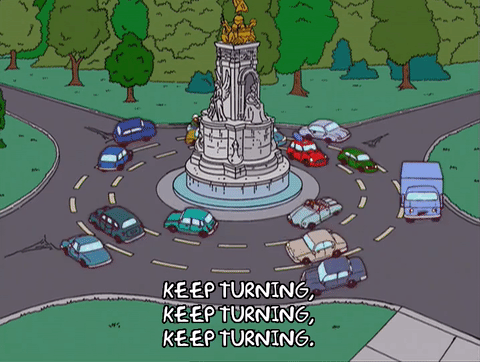Those lucky students who live on campus can roll out of bed 30 minutes before class and still arrive on time. Living an hour away from school, commuters don’t get that luxury.
When my parents first told me that I’d commute to George Washington University, I felt extremely nervous. During all those college trips I heard about how dorming defined people’s college experiences. Would that still happen to me? I’m also not a morning person at all. I like to stay in bed as long as possible. How could I structure my college schedule if I have trouble waking up in the mornings?
I tried making this as non-sucky as possible. For five days a week, I took the Red Line from Shady Grove to Metro Center, then hopped onto the Orange/Blue/Silver Lines to Foggy Bottom/GWU. When I planned that out in the summer, I didn’t think it would be so bad. I did a few trial runs to figure out the route and find my first semester classes.
Knowing that I’m not a morning person, I scheduled afternoon and late morning classes. My earliest class was 11:10 a.m. For me, that meant leaving the house no later than 9 a.m. If I got to the Metro station later than 9:15 a.m., I’d arrive on campus around 11:15 a.m., late to class.

Unfortunately, that morning schedule didn’t normally go as planned. I always ended up late to my 11:10 a.m. classes, but always on time to afternoon classes. I’d scramble out of the Metro car and run up the left side of the escalators until I reached the busy Foggy Bottom campus. On my first day, it was overwhelming to see everyone rushing around the city. I had to weave around people and hurry along the streets to get to class.
Why don’t you drive to D.C. instead, everyone asked me. Wouldn’t that be easier?
Sure, if I went to school on literally any other college campus. Driving to GW is different. Since it’s a city campus, it means driving with congested rush hour traffic. If there’s an accident, you’re stuck on the road for hours. Besides that, I know parking troubles exist on all college campuses. And parking in a large city is a whole different matter. You’ll mostly find difficult parallel parking and expensive parking garages.

So Metroing was the safer option. For the most part, it’s reliable. I knew that the ride would never last less than 45 minutes and more than two hours. I could spend the time working on class assignments, catching up on my sleep or mentally preparing for the day.
Besides that, the commuter population at GW is really small. In classes, I used my commuter status as my “fun fact.” I bonded with commuters I met through classes or clubs. However, I didn’t get as close with my on-campus and off-campus friends as I liked. When not in class, I studied. I didn’t spend my time really socializing on campus, so I never really casually visited friends in dorms or for meals in the dining hall. In the evenings, I tried to attend as many campus events as I could, but I usually felt too tired or worried about commuting home. Usually, if I stayed on campus later than 10 p.m., then I wouldn’t get home until one in the morning.
After freshman year, my parents decided to let me live on campus after seeing the heavy toll commuting took on me. They saw my exhaustion when I came into the house after 10 p.m. and my dwindling bank account after spending money on food, the Metro and parking. They also figured that it’d be cheaper to live there, because GW would give us more financial aid, especially since my little sister was starting college.
I do miss the sense of independence and structure that I got from commuting. Unlike GW students who stayed in the Foggy Bottom bubble, I traveled throughout D.C. and Maryland and started to learn about the area like a longtime locals. No matter how exhausted I felt, I loved feeling like a working professional heading out to her day in the city.
However, I definitely don’t miss leaving the house at least two hours before class to get to campus on time. I get to sleep more in the morning. Now I can wake up 30 minutes before class starts. I still scramble around in the mornings and rush to classes, though. Because let’s face it—I’m not a morning person, no matter where I live.



















